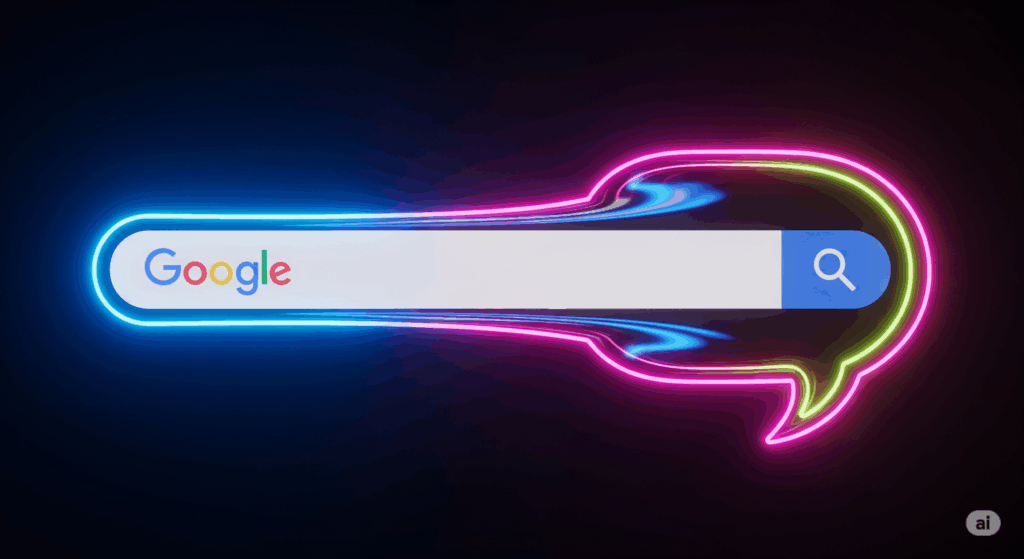At Google I/O 2025, the company dropped quite the bombshell: AI Mode is here. And it’s not just a feature, it’s the future of how people will discover (or ignore) your brand. This is a full-on paradigm shift, one that redefines what content is, how it works, who sees it, and whether your brand is remembered or forgotten.
Want to Survive AI Mode? Write Like a Human.
Start by ditching the one-size-fits-all content strategy. If your copy isn’t emotionally intelligent, context-aware, and rich in real-world signals, AI Mode will overlook it.
Google’s new assistant is looking for resonance, not just for relevance. That means writing for moments, moods, and micro-intents, not just keywords.
Why AI Mode Needs a New Kind of Copy
Google’s AI is now a personal assistant with interactive capabilities that knows where you’re going this weekend, what you had for dinner, and which breakup song you’ve had on repeat. It functions like a chatbot and allows follow-up queries. As copywriters, we need to write with all that in mind.
If your content strategy still starts with keyword research and ends with a tidy CTA, it’ll likely get ghosted by AI Mode.
It’s a Whole New Chat to Become Fluent With
Unlike previous AI tools, which often responded only to straightforward commands or simple queries, this AI demands a different kind of interaction that feels more like having a conversation with your personal assistant. For example, it’s not yet second nature for us to Google or demand of AI, “Find us two tickets to Wicked next Saturday,” because earlier versions of AI weren’t designed to handle such specific, context-rich requests and act on them directly.
We’re essentially learning a new language for communication with AI, moving beyond punching in isolated queries to providing detailed instructions that require it to read the room—understanding nuance, preferences, mood, and context. This shift means users must develop new habits: they need to get comfortable specifying exactly what they want, clarifying details, and trusting the AI to carry out complex tasks. It’s a learning curve for both the technology and the people using it.
TL;DR: Search Is No Longer About Keywords. It’s About People.
With AI Mode, every result is hyper-personalised using:
- Your Gmail and Calendar data
- Your YouTube history
- What you’ve searched before
- Your Maps behaviour
In other words, SEO has gone bespoke, and if your brand isn’t already in a person’s digital orbit, you may never show up at all. The twist? Users can choose to connect or disconnect these data sources at any time.
7 Ways AI Is Rewriting the Rules of Content
- The Funnel Is Dead. Long Live the Moment.
AI Mode means users aren’t “entering the funnel”; they’re Googling “how to break a lease without legal drama” at 2am, or searching for “best vegan snacks to eat while crying in traffic.” So, forget linear journeys, we’re now jumping straight in.
What to do instead:
- Use conversational-but-emotional cues to guide content creation. Don’t optimise for “insomnia.” Optimise for “I’ve got a big day tomorrow and I’m wide awake.”
- Create modular content that works at every intent level, from curious to crisis mode. Modular content is built from reusable blocks, each with a clear purpose, that can be combined in different ways to match different audiences, intents, or moments. Especially handy when AI is doing the assembling.
2. Search Is Emotional. Your Content Should Be, Too.
Google’s AI isn’t just indexing facts, it’s interpreting feelings. People aren’t searching for “depression therapy.” They’re typing “I don’t feel like doing anything anymore.” Your brand has to understand that feeling to be found.
What to do instead:
- Go beyond keywords. Think behavioural and emotional queries.
- Use UGC, Reddit threads, and social listening to find the actual language your audience uses.
- Optimise for why people search, not just what they search.
3. New Brands Beware: Discovery Just Got Way Harder
If your brand doesn’t have strong authority, visibility, or online presence, you’re far less likely to appear in AI Mode, especially when users haven’t interacted with you before. While there’s still some potential for discovery, early studies suggest that established brands with more signals (mentions, links, search history) tend to dominate. In other words, if you’re new to the market, it’s going to be an uphill battle.
What to do instead:
- Borrow audiences. Collaborate with creators inside your audience’s bubble.
- Invest in discovery channels like TikTok SEO, Pinterest and Reddit.
- Act like a PR strategist: get featured, linked, talked about. It trains the AI.
4. SERPs Are More Competitive Than Ever
You need to be the content that Google summarises, highlights, or quotes, as ranking is no longer enough.
What to do instead:
- Use pull quotes, schema markup, FAQs, and bullet lists.
- Write like you’re building a cheat sheet for a friend.
- Monitor what’s being pulled into AI Overviews and reverse-engineer it.
- Tools like Ahrefs can help you track featured snippets, People Also Ask boxes, and emerging AI Overview patterns, so you can optimise content specifically for those formats.
5. Life Moments Drive Search, So Build for Them
Someone’s planning a trip to Byron Bay. Their Google Calendar knows it, and so does their SERP. Suddenly, the beachwear brand you’re marketing has 3 seconds to make an impression, if you’ve written the right content.
What to do instead:
- Build content clusters for life events: weddings, holidays, new jobs, breakups, and marathon season.
- Think beyond keywords. Think life moments like:
- “Packing for a solo trip when you have anxiety”
- “First date outfits that don’t scream ‘I hate it here”
- “Weekend plans that say ‘I’m social’ but also ‘I need a nap’”
6. The Algorithm Doesn’t See Personas, It Sees People
Forget “millennial mums” or “time-poor Gen Z professionals.” Google’s AI doesn’t care about your segments; it now learns about individuals who are about to feel extremely seen. Every blog post, press placement, TikTok caption, and product page teaches the algorithm who you are and who you’re for.
What to do instead:
- Stop writing content for “personas” and start building trust with human-to-human writing.
- Feed the AI consistent, specific, semantically rich signals across every platform.
- Train Google to know your brand so you stay top-of-mind when someone’s searching with their soul, not just their screen.
While we’re predicted to see fewer clicks overall, bang-on bespoke search results could lead to more meaningful interactions and increased conversions.
7. E-E-A-T Is Still Everything
In AI Mode, Google isn’t just skimming your blog, it’s asking, “Should we trust this?” If your content doesn’t clearly show who wrote it, why they’re qualified, or where the facts came from, you’ll be invisible.
What to do instead:
- Add author bios with credentials, not just cute intros.
- Include quotes from real experts, not ChatGPT screenshots.
- Reference reputable sources and link out generously.
- Validate your content like it’s going to peer review.
The Future of Search is Personal… And Data-Driven
At Yoghurt Digital, we don’t just chase clicks or rankings, we dive deep into understanding your customers through real data. When every online action is measurable, insights are a significant advantage.
We build strategies rooted in what the data tells us, not just what sounds good. This means creating content that genuinely connects, adapts, and converts in the age of AI-powered, hyper-personalised search.
As search evolves from generic rational queries to individual emotional moments, Yoghurt Digital will help your brand be seen and remembered for the right reasons, by the right people, at the right time.
Get in touch for a personalised audit and discover where you can adapt for success in 2025.


